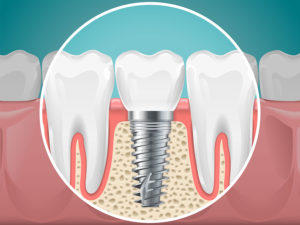
We tend to overlook the health of our jawbones. It’s easy, since this is a part of our oral anatomy that we don’t see. That being said, our bone health is actually very important because it serves as the foundation of support for our teeth. When our bone deteriorates after tooth loss, it can contribute to uncomfortable eating and chewing, untimely aging, and the loss of additional teeth.
What makes up dental implants?
Dental implants are prosthetics made from titanium. This metal is ideal because bone will treat it the same way it treats mineralized tooth structure. After implants are embedded, bone will stabilize these prosthetics by fusing to it.
Implants are small and shaped like a screw. Dental implants have abutments where restorations and prosthetics such as crowns and bridges can attach to complete the tooth replacement process.
How long do dental implants last?
When a person maintains relatively good oral health, his or her implants could last for decades. Implants are very durable and stand up to the forces associated with tearing, biting, and chewing food.
Although dental implants have a long lifespan and are resistant to disease, some oral health conditions can affect their longevity. Anything that affects bone and gum health, such as bone loss or gum disease, could threaten an implant’s ability to function. This is why it’s important to keep routine appointments for checkups and to practice proper oral hygiene.
If you are interested in evaluating your tooth replacement options, we invite you to schedule an appointment with our implant dentist. During your visit, our team can help you determine if this treatment option is right for you.
